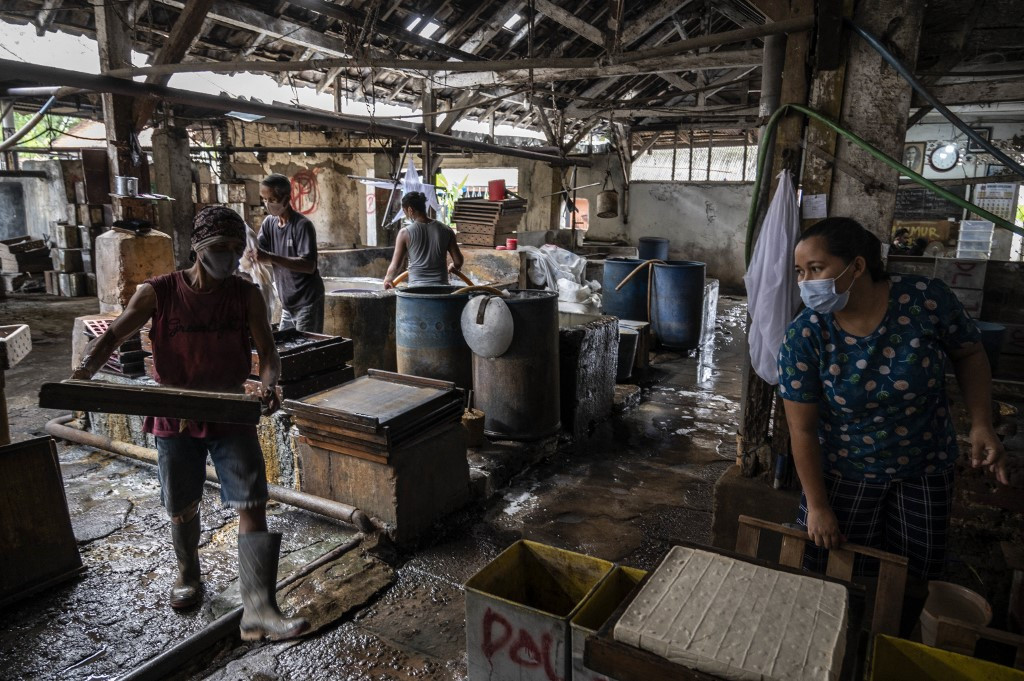The mood of the local manufacturing industry has improved slightly over the past month to rise above most other Asean countries, a report that has been released shows.
Indonesia’s manufacturing purchasing managers’ index (PMI) booked a monthly increase of 0.6 to 51.9 in April, while Thailand’s rose 0.1 to the same level, according to a report published by HIS Markit, a subsidiary of financial information firm S&P Global.
The two countries rank third among Asean states according to the latest manufacturing PMI. The report also shows that Indonesia’s rate of improvement was the fastest since January, which it attributes to increased economic activities as a result of relaxed Covid-19 restrictions.
The report is based on a survey of manufacturing purchasing managers who were asked whether business conditions had improved or worsened over the past month in a number of indicators, including customer orders, supply deliveries and employment levels.
Singapore and the Philippines top the list, with the former booking an astounding 3.1-point month-to-month (mtm) increase in its manufacturing PMI to 58.1, while the latter increased 1.1 points to 54.1. Meanwhile, Vietnam’s manufacturing PMI remained unchanged at 51.7 while Malaysia saw a 2- point mtm increase to 51.6.
The overall manufacturing PMI for Asean grew 1.1 points to 52.8 in the seventh consecutive month of improving figures.
"The growth momentum picked up across the Asean manufacturing sector in April as the headline PMI rose to the second highest on record.
"Stronger client demand supported increases in new orders and output. In turn, employment rose at near-record rates after contracting in the previous two survey periods," S&P Global economist Maryam Baluch is quoted as saying in the report.
S&P Global also noted that demand had begun to see a significant increase as pandemic restrictions were gradually lifted in Asean states, spurring new orders and increasing factory output.
As a result, manufacturing sector employment in the region increased for only the second time in the last 35 months, with job creation the second fastest ever recorded by the firm. Only Malaysia saw a decline in manufacturing employment in April.
"Whilst the region's manufacturing sector continues to recover from the recent waves of Covid-19 infections, persistent supply chain challenges and inflationary pressures are expected to remain headwinds to expansion," Baluch said in the report.
She added that rising global uncertainty might exacerbate current obstacles to growth, singling out China’s Covid-19 situation and Russia's invasion of Ukraine as risk factors.
While Indonesian purchasing managers remain generally optimistic about the business outlook for the next 12 months, business confidence has dropped from the previous month.
Several issues still plague the local manufacturing sector, such as supply constraints and price pressures due to global inflation.
"[Business] confidence fell sharply over April, and it will be worth monitoring the impact of higher inflationary pressures.
"With that said, the increase in purchasing activity and importantly, the solid expansion of workforce numbers, continued to reflect some confidence from firms for the near term," S&P Global economics associate director Jingyi Pan said in a separate report released on Wednesday.
In response to the S&P Global reports, the Finance Ministry applauded the government’s successful pandemic handling and expressed hope that manufacturers’ inventory purchasing spree would generate a multiplier effect toward domestic recovery.
"To sustain strengthening consumption and production amid price pressures, the government is active in both price and non-price interventions through social protection for the poor and vulnerable, as well as through strong coordination between institutions to maintain balance between supply and demand," the ministry's Fiscal Policy Agency (BKF) head, Febrio Kacaribu, said in a press release.
Bhima Yudhistira, director of think tank Center of Economics and Law Studies (CELIOS), warned that input production costs could increase as a result of inflationary factors, meaning that an increase in sales would be less beneficial due to reduced profit margins.
He also told The Jakarta Post that he believed not all consumers could handle the burden of inflation-induced price increases from manufacturers.
"People living on lower or middle incomes would prefer affordable alternatives. The real challenge in the manufacturing sector will come after Idul Fitri,” he said, as the United States Federal Reserve’s rate hike would “affect the cost of funds, the cost of capital for businesses to expand".
Source image: Employees make tofu on Jan. 20, 2022 at a cottage factory in Surabaya. - AFP
Source: TheStar / (Jakarta Post/ANN)
May 18, 2022













